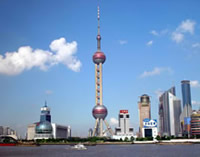|
|


ADVERTISEMENT
Buy Your own advertising
spaces!
.
Download Adobe Acrobat Reader to open [PDF] files.
Recent Visitors
A Sneak Preview of the 2010 Shanghai World Expo
2010. 6 April
(pbs.org) SUSIE GHARIB: It could be the biggest mass marketing event you've never heard of. The 2010 Shanghai world expo is preparing to open its doors and it's expecting a few visitors. An estimated 70 million people will visit the expo over the next six months. For U.S. businesses, it's a chance to forge deals and bring their products to millions of Chinese consumers. Nick Mackie has a preview.
NICK MACKIE, NIGHTLY BUSINESS REPORT CORRESPONDENT: They're working around the clock to ready this former gritty riverside industrial zone for the world's biggest national and corporate showcase ever. One hundred ninety two countries marketing their talents and visions for the future around a common theme -- better city, better life -- or how to develop livable cities. U.S. Pavilion President Nick Winslow.
NICK WINSLOW, US PAVILION PRESIDENT: There have been the great Chicago fairs and the San Francisco fairs. Those were all magnificent, huge events that changed their city and this dwarfs them. I don't think people understand how big this thing is going to be.
MACKIE: And guess who came close to missing it. By May of last year, the U.S. organizers, a private non-profit, had raised just 10 percent of the $61 million needed to build and run the U.S. Pavilion. As the U.S.'s top expo official, Commissioner General Jose Villareal explains, there could be no government bail out.
JOSE VILLARREAL, US COMMISSIONER GENERAL, WORLD EXPO 2010: We rely entirely on private sector funding for our pavilion. Federal law does not permit the use of Federal funds for the building of a pavilion or participation in any world expo.
MACKIE: Corporate sponsorship was also a tall order, given the financial crisis. But to the Chinese government, failure to attend would have been a snub of the highest order. So by the summer of 2009, State Secretary Hillary Clinton was the de facto fundraiser in chief, having promised the Chinese that the show would go on.
VILLARREAL: As Secretary Clinton likes to say, it would have been unimaginable for the United States to be the only country on the face of the earth not to participate in this global event.
MACKIE: Big names, including Pepsico, Johnson & Johnson, Chevron and General Electric answered the Clinton call. Ninety percent of the budget is now in place. But unlike many other participants -- like here, Australia -- the U.S. has been keeping its pavilion's interior under wraps, except to say that visitors will be treated to a multimedia spectacular, telling a story of how individuals can make a difference and -- the corporate message -- how technologies change the way we live for the better. As for Shanghai, it's on a $45 billion citywide expo makeover, more than Beijing spent on the Olympics, as it seeks to establish its credentials as an international financial, trading and shipping center. In preparing the expo site, it relocated 18,000 families and 270 factories, including a huge shipyard which employed 10,0000 workers. Better city, better life. Of course, no one can be sure if the U.S. or its sponsors will make a return on their expo investment, despite the anticipated 400,000 visitors to the site every day. But what is clear is that a no-show, or even a smaller commitment, was not a viable alternative. And that's especially the case right now, at a time of increased tensions between the world's most competitive of nations. Nick Mackie, NIGHTLY BUSINESS REPORT, Shanghai.
Source: www.pbs.org

